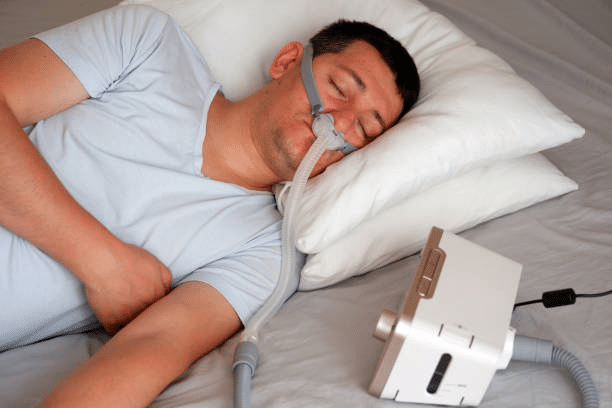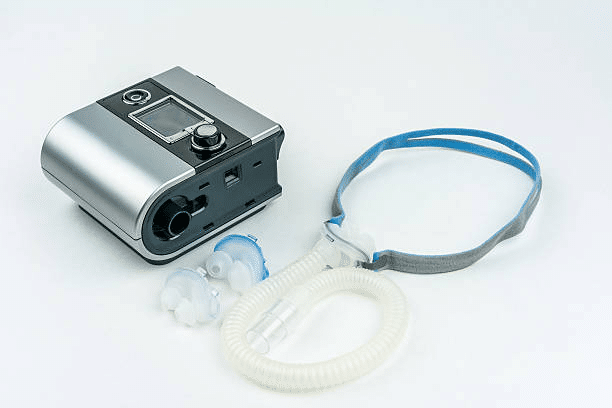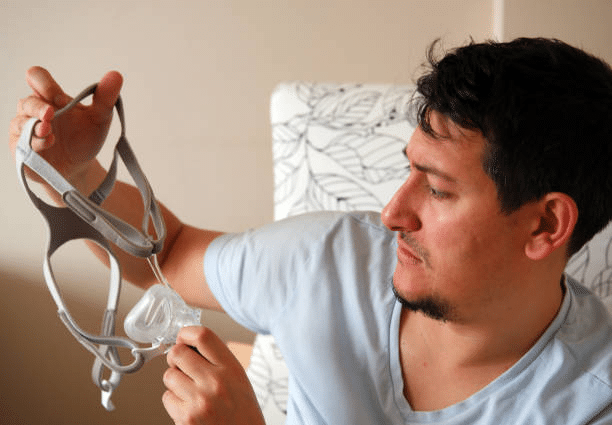A good night’s sleep is a cornerstone of our overall well-being, allowing us to wake up refreshed, rejuvenated, and ready to tackle the day ahead. Unfortunately, achieving restful sleep can be a significant challenge for individuals with sleep apnea.
However, there is hope. In sleep medicine, Continuous Positive Airway Pressure (CPAP) therapy has emerged as a highly effective solution to enhance sleep quality for individuals with sleep apnea.
In this article, we at CPAPwater will delve into the world of CPAP therapy and explore tips and lifestyle changes that can further enhance its effectiveness. We will start by understanding the fundamentals of CPAP therapy—what it is and how it works. Let`s dive in!
Understanding CPAP Therapy

A good understanding of CPAP (Continuous Positive Airway Pressure) therapy is crucial for individuals seeking to enhance their sleep quality.
CPAP treatment involves using a specially designed machine that delivers a continuous flow of air pressure to keep the airways open during sleep. By wearing a comfortable mask connected to the device, the gentle air pressure acts as a splint, preventing the collapse of the airway and ensuring a steady flow of oxygen. This allows for uninterrupted breathing and promotes restful sleep throughout the night.
CPAP therapy has been widely recognized for its effectiveness in improving sleep quality and alleviating obstructive sleep apnea symptoms. By ensuring a continuous and unobstructed airflow, CPAP helps reduce episodes of breathing pauses, snoring, and oxygen deprivation during sleep. The benefits extend beyond a good night’s sleep.
Individuals who adhere to CPAP treatment often experience increased energy levels, improved cognitive function, and enhanced mood, leading to a better quality of life.
It is natural for sleep apnea patients to have concerns or misconceptions about CPAP therapy. One common concern is the discomfort associated with wearing a mask during sleep. However, technological advancements have led to the development of lightweight, comfortable masks that fit securely and minimize discomfort.
Other concerns may include noise, travel inconveniences, or the perception of dependency on the machine. Addressing these concerns and providing reassurance can help individuals confidently embrace CPAP therapy and overcome any reservations they may have.
Tips For Effective CPAP Use

To maximize the benefits of CPAP therapy and ensure optimal sleep quality, it is essential to use the equipment correctly and maintain proper hygiene.
Let’s explore the valuable tips and guidelines for practical CPAP usage below.
Selecting The Right CPAP Machine And Mask
- Understanding Different CPAP Machine Types: There are various types of CPAP machines available, including standard CPAP, APAP (Auto-adjusting Positive Airway Pressure), and BiPAP (Bi-level Positive Airway Pressure). Consult with your healthcare provider to determine the most suitable option based on your needs.
- Factors to Consider When Choosing a Mask: The mask is crucial in the comfort and effectiveness of therapy. Consider factors such as mask style (nasal, full-face, nasal pillows), size, and compatibility with your facial features and sleeping position. A well-fitted mask to treat sleep apnea promotes better therapy adherence and reduces leaks or discomfort.
Also Read: How to Manage CPAP Mask Water and Prevent Rainout
Ensuring Proper Setup And Fit
- Step-by-Step Setup Instructions: Follow the manufacturer’s instructions and your healthcare provider’s guidance for correctly setting up the CPAP machine. This typically involves connecting the mask, adjusting the straps for a snug fit, and properly connecting the tubing to the machine.
- Optimal Comfort and Effectiveness: Adjust the mask for optimal comfort and effectiveness by ensuring a proper seal. Adjust the straps, headgear, and mask cushion to minimize leaks and maximize therapeutic benefits. Experiment with different adjustments until you find the most comfortable fit.
Maintaining Hygiene And Cleanliness
- Importance of Regular Cleaning: Regular cleaning of the CPAP machine and mask is crucial to prevent the buildup of bacteria, allergens, and irritants. Follow the manufacturer’s guidelines for cleaning frequency and use mild soap or CPAP-specific cleaning solutions.
- Tips for Cleaning: Clean and dry the mask, tubing, and humidifier chamber daily. Replace filters, tubing, and mask cushions as recommended. Ensure proper storage of the equipment in a clean and dust-free environment.
Selecting a suitable CPAP machine and mask, ensuring proper setup and fit, and maintaining good hygiene practices, individuals can optimize their CPAP therapy experience and enjoy enhanced sleep quality.
Lifestyle Changes To Complement CPAP Therapy
In addition to CPAP therapy, making specific lifestyle changes can significantly enhance the effectiveness of your treatment and promote better sleep quality.
Sleep Hygiene Practices
- Establishing a Consistent Sleep Schedule: Set a regular sleep schedule by going to bed and waking up at the same time each day. This helps regulate your body’s internal clock and promotes more restful sleep.
- Creating a Sleep-Friendly Environment: Make your bedroom a comfortable and soothing space conducive to sleep. Ensure proper temperature, minimize noise, and block out any excess light that may disrupt your sleep.
Also Read: How Sleep Position Can Improve CPAP Therapy for Sleep Apnea
Healthy Habits For Better Sleep
- Regular Exercise and Its Impact on Sleep Quality: Engage in regular physical activity, as exercise can promote better sleep. However, avoiding vigorous exercise close to bedtime is recommended, as it may interfere with sleep.
- Dietary Considerations for Improved Sleep: Be mindful of your diet and avoid heavy meals, caffeine, stimulating substances, and anything that may raise your blood pressure close to bedtime. Opt for lighter, sleep-friendly snacks and consider herbal teas for relaxation-promoting foods.
Managing Stress And Relaxation Techniques
- Stress-Reducing Strategies to Promote Restful Sleep: Identify and address sources of stress in your life. Implement stress-management techniques such as journaling, practicing gratitude, or engaging in hobbies that promote relaxation.
- Exploring Relaxation Techniques: Incorporate relaxation techniques into your bedtime routine, such as meditation, deep breathing exercises, or gentle stretching. These practices can help calm the mind and prepare your body for a peaceful night’s sleep.
These lifestyle changes work synergistically with your treatment to promote restful and rejuvenating sleep, contributing to overall well-being.
Troubleshooting And Overcoming Challenges

While CPAP therapy can significantly improve sleep quality, individuals may encounter specific challenges.
Addressing Common Issues Faced During CPAP Therapy
- Mask Discomfort and Skin Irritation: Many individuals experience initial discomfort or skin irritation when using a CPAP mask. This can be due to mask fit, material sensitivity, or improper adjustments. It is essential to address these issues to ensure comfort during sleep.
- Claustrophobia or Feeling Restricted by the Mask: Some individuals may experience feelings of claustrophobia or a sense of being restricted while wearing the CPAP mask. These sensations can affect therapy adherence and sleep quality.
Troubleshooting Tips And Potential Solutions
- Mask Adjustments for Increased Comfort: Experiment with different mask styles, sizes, and adjustments to find the one that provides the best fit and comfort for you. Try using mask liners, nasal pads, or nasal cushions to alleviate discomfort and reduce skin irritation.
- Seeking Professional Assistance When Needed: If you continue to experience challenges despite your efforts, consult your healthcare provider or CPAP equipment supplier. They can offer guidance, make mask adjustments, or recommend alternative solutions to improve your therapy experience.
Remember, troubleshooting is a normal part of the Continuous Positive Airway Pressure journey to improve sleep apnea, and solutions are available to help overcome any challenges.
The Impact Of Enhanced Sleep Quality
Enhancing sleep quality through CPAP therapy and lifestyle changes can profoundly impact overall health and well-being, especially for individuals with mild sleep apnea.
Quality sleep is vital in maintaining physical health, mental well-being, and cognitive function. Adequate sleep promotes a robust immune system, improves memory and concentration, and reduces the risk of chronic health conditions. By prioritizing sleep, individuals can experience increased energy, enhanced mood, and improved overall quality of life.
CPAP therapy, combined with lifestyle adjustments, can significantly enhance sleep quality and address obstructive sleep apnoea symptoms such as daytime sleepiness. By using CPAP, individuals can enjoy uninterrupted breathing, reduced snoring, and improved oxygenation during sleep. The positive effects are amplified by healthy habits such as regular exercise, maintaining a consistent sleep schedule, and managing stress, leading to a transformative sleep experience.
Individuals with moderate sleep apnea must prioritize their sleep and recognize the significance of addressing their worsen sleep apnea. Individuals can take control of their sleep health by seeking a diagnosis, understanding the benefits of CPAP therapy, and implementing lifestyle changes. It is essential to consult with healthcare professionals, explore available treatment options, and consider CPAP therapy a viable solution to enhance sleep quality and improve overall well-being.
Embrace CPAP Therapy And Lifestyle Changes
Prioritizing sleep quality to improve sleep apnea is essential for our overall health and well-being. With the help of CPAP therapy and lifestyle changes, individuals with obstructive sleep apnea can significantly enhance their sleep experience and overall quality of life.
By combining the power of CPAP therapy with these lifestyle adjustments, individuals can experience remarkable transformations. From increased energy levels and productivity to reduced health risks associated with untreated sleep apnea, the impact of enhanced sleep quality reaches far beyond the nighttime hours. It is a journey toward better health, both physically and mentally.
We encourage you to take the necessary steps to prioritize your sleep. Consult with healthcare professionals to explore CPAP therapy options and create a personalized treatment plan that suits your needs. Embrace the positive effects of sleep apnea treatment and implement lifestyle changes that support a restful night’s sleep.
Improve your sleep apnea treatment and overall well-being with the right CPAP accessories. Take a simple step towards better sleep by visiting our selection today.
Have thoughts on this article? Share it and let’s discuss!




